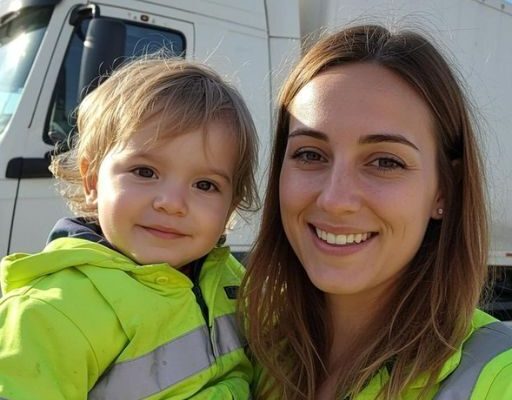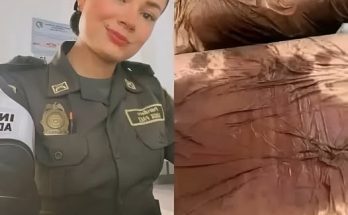I’ve been hauling freight since I was nineteen—long miles, longer nights, and the kind of quiet only a highway can offer. But when daycare started costing more than diesel, I made a choice some folks didn’t quite understand. I strapped a car seat into my rig, packed a cooler full of snacks, and brought my toddler, Micah, on the road with me.
Micah’s two now. He’s sharp and stubborn and treats the highway like his backyard. He knows his way around a CB radio better than some rookies I’ve trained, and he loves the sound of the engine beneath his boots and the chase of the sunrise. Out here, it’s just the two of us—and that rhythm of the road that somehow keeps us grounded.
We wear matching neon vests, split peanut butter crackers at weigh stations, and sing ‘80s songs off-key to stay awake. It’s not a glamorous life, but it’s ours. Still, nothing prepared me for what happened just outside Amarillo.
One evening, we stopped at a rest area. I was checking the trailer while Micah played nearby with his toy truck. Out of the blue, he asked, “Mama, when is he coming back?”
I looked over. “Who, baby?”
“The man who sits in the front,” he said. “He was here yesterday.”
We’ve always been alone in the truck. I don’t allow strangers near us, especially not in the cab. My heart raced. I crouched beside him. “What man, sweetheart?”
He just shrugged. “The one who gave me the paper. He said it’s for you.”
Later that night, after Micah was asleep in his bunk, I reached into the glove box for my logbook—and found a folded piece of paper with Micah’s name on it. In it was a pencil drawing of me and Micah in the cab: him laughing with his toy, me handing him a slice of apple, steering with the other hand. The details were exact. My ponytail. His mismatched socks. And below it, in neat handwriting: Keep going. He’s proud of you.
There was no name. No signature. No explanation. Just that one message.
I tucked the sketch into the visor and held Micah close that night, listening to the hum of the truck and wondering what exactly was happening.
The next day, while fueling up near Flagstaff, an older man approached. “You the driver with the little boy?” he asked. When I nodded, he pointed toward the diner. “Talk to Dottie inside. She saw something near your truck.”
Dottie, a sharp-eyed woman who seemed to have run the diner forever, leaned in close. “Yesterday, I saw a tall man on the passenger side of your rig. Beard. Denim jacket. Looked like he was talking to someone inside.”
My blood ran cold. “We weren’t even in the truck yesterday.”
She stared for a beat, then walked to the back and handed me an unmarked envelope. Inside was another drawing—this time, me and Micah asleep in the cab. His head was on my chest, and I had tears on my cheeks. The note underneath simply read: You’re not alone. You never were.
I didn’t know what to say. I thanked her, took Micah by the hand, and kept driving.
That night, it finally clicked. The handwriting. The drawing style. The details. They reminded me of my brother Jordan. He passed away six years ago in an accident. He’d never met Micah, never saw me become a mom. But he used to draw like that—all soft pencil lines and quiet love.
I’d never told Micah about him.
But somehow… Micah knew him.
After that, little things started happening. Before I’d hit a sharp curve or drive past a waiting patrol car, Micah would say, “Uncle Jo says slow down.” Toys that had gone missing showed up in odd places. And the sketches kept coming.
One showed a sunrise behind my truck: Keep driving. You’re building something beautiful.
Another had me hugging Micah at a rest stop: You’re stronger than you think.
After a tough week, I opened the fridge to get Micah’s milk and found a final note taped to the carton. No drawing this time—just one line: He’ll remember your strength, not the miles.
Maybe you’ve felt something like this too—a breeze when no window’s open, a thought that doesn’t feel like your own. A gentle nudge when you need it most.
I’m sharing this because someone else out there might need to hear it: Love doesn’t disappear when someone’s gone. Sometimes, it just rides in the passenger seat.



